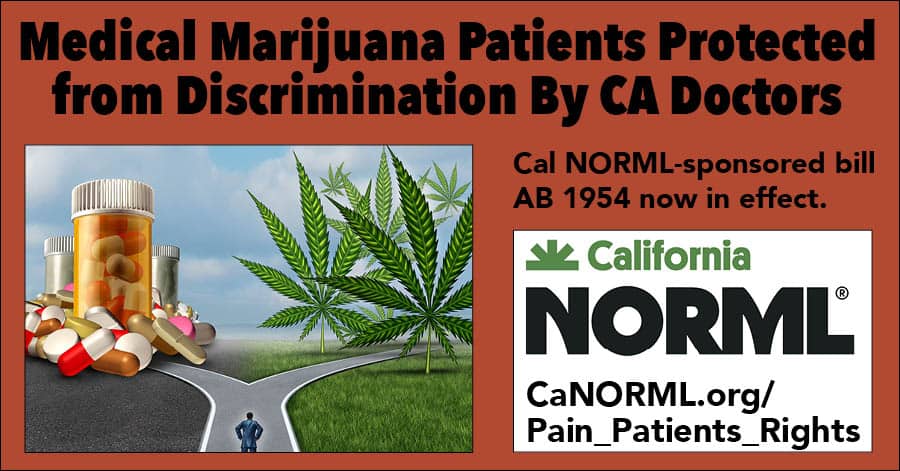
Download a Fact Sheet with this information.
A law that took effect on January 1, 2023 (AB 1954 – BPC 2228.5) prohibits physicians and health plans to have policies denying medical treatment to qualified patients with a recommendation to use medical marijuana. The only exception is if a clinical determination is made on a case-by-case basis that a “medically significant” contraindication exists.
The law states, “A physician and surgeon shall not automatically deny treatment or medication to a qualified patient based solely on a positive drug screen for tetrahydrocannabinol (THC) or report of medical cannabis use without first completing a case-by-case evaluation of the patient that includes, but is not limited to, a determination that the qualified patient’s use of medical cannabis is medically significant* to the treatment or medication.” It further states, “The use of medical cannabis that has been recommended by a licensed physician and surgeon shall not constitute the use of an illicit substance in the evaluation described.”
PHYSICIAN PROTECTIONS
Physicians are protected by the clause in the new law saying, “No physician and surgeon shall be punished, or denied any right or privilege, for having administered treatment or medication to a qualified patient within the requirements of this section and consistent with the standard of care.” A similar exemption exists for physicians in Prop. 215, the Compassionate Care Act (HSC 11362.5) by which California voters legalized the use of medical marijuana in 1996.
Except for a single case where doctors were financially involved in a cannabis dispensary operation, the DEA has never taken action against doctors who recommend or allow the use of medical cannabis by their patients. In 2003, the US Supreme Court let stand a 9th Circuit Court of Appeals ruling that doctors have the right to recommend medical marijuana to their patients (Conant v. Walters, 309 F.3d 629 (9th Cir. 2002).
There is no law requiring pain clinics or doctors to screen out marijuana users. Medical marijuana patients are being caught up in a push to drug test in order to ensure compliance with prescription opiates. Many practitioners wrongly assume that they are obliged to screen out marijuana users as well.
*The “medically significant” exemption in AB 1954 means that a physician and surgeon must make a clinical determination that the treatment or medication “is contraindicated or is likely, or expected, to cause an adverse reaction or physical or mental harm to the qualified patient if administered or used in conjunction with THC or medical cannabis, based on the known clinical characteristics of the patient and the known characteristics and history of the patient’s treatment or medication regimen.” It can also mean the treatment or medication is expected to be ineffective, could worsen a comorbid condition, could decrease the capacity to maintain a reasonable functional ability in performing daily activities, or could pose a significant barrier to adherence to, or compliance with, the qualified patient’s drug regimen or plan of care.
STUDIES AND POLICIES ON MEDICAL CANNABIS FOR PAIN
A great many studies have found that cannabis access is associated with reduced rates of opioid use and abuse, opioid-related hospitalizations, opioid-related traffic fatalities, opioid-related drug treatment admissions, and opioid-related overdose deaths. Knowledgeable specialists therefore regard medical marijuana as an exit, rather than a gateway, to narcotic abuse.
The California Center for Medicinal Cannabis Research, established by the state legislature at University of California in 2000 to conduct controlled scientific studies of medical marijuana, has reported positive results in human clinical trials regarding chronic pain, in particular neuropathic pain.
In 2017, the National Academy of Science released a major report on cannabis, which concluded that chronic pain is one of the few conditions for which there is “conclusive or substantial evidence” for cannabis’s effectiveness.
In 2019 the California Medical Association House of Delegates voted to adopt a recommendation stating, “That CMA oppose policies of health plans, health systems, and hospitals that have pain management programs that automatically eliminate patients who use therapeutic cannabis.”
The US Veteran’s Administration policy is not to deny treatment to patients who are participating in state medical marijuana programs.
WHAT SHOULD PATIENTS AND DOCTORS DO?
Doctors and health plans need to review their policies to be sure they are complying with state law. They can get training from the Society of Cannabis Clinicians on proper use and dosage of cannabis medicines.
Patients who have experienced discrimination by their doctors because they use cannabis are advised to file a complaint with the CA Medical Board. See a sample letter to the Medical Board. They should also contact Cal NORML to file a complaint and possibly take legal action.
OTHER LEGAL PROTECTIONS FOR MEDICAL MARIJUANA PATIENTS IN CALIFORNIA
• “Ryan’s Law,” (HSC 1649 – 1649.6) passed in 2021, requires hospitals and certain health care facilities to permit the use of nonsmoked cannabis by patients with terminally ill diseases. SB 302 (Stern), a 2023 bill, expands these protections to seniors 65 and over with chronic medical conditions. Also see: Americans for Safe Access Patient’s Guide to Ryan’s Law
• Prop. 64, the Adult Use of Marijuana Act or AUMA, which California voters passed in 2016, protects the parental rights of medical marijuana patients under HSC 11362.84, which states, “The status and conduct of a qualified patient who acts in accordance with the Compassionate Use Act shall not, by itself, be used to restrict or abridge custodial or parental rights to minor children in any action or proceeding under the jurisdiction of family or juvenile court.” In addition, AB 2595 (Jones-Sawyer, 2022) requires the State Department of Social Services to treat a parent’s use of cannabis in the same manner as alcohol or legally prescribed medication under WIC 328.2.
• SB 1186 (Wiener – 2022) will require cities and counties to permit deliveries of medical cannabis in their jurisdiction starting on January 1, 2024. Local governments have begun to amend their ordinances to comply with the new law. Also see: How California Senate Bill 1186 Will Expand Medical Delivery Statewide.
• AB 258 (Levine, 2015) outlaws discrimination against medical marijuana patients who need organ transplants under HSC 7151.36.
• AB 2188 (Quirk, 2022) outlaws employment discrimination due to testing for inactive THC metabolites in urine or hair by most California employers. Employees may not be impaired on the job, and may be subject to an oral swab or blood test. SB 700 (Bradford, 2023) bans questions about past marijuana use by most employers in California. Read more.
Medical marijuana patients are often unable to find places where they can safely use their medicine. Cal NORML is working to open more cannabis consumption lounges in California. Read more.



